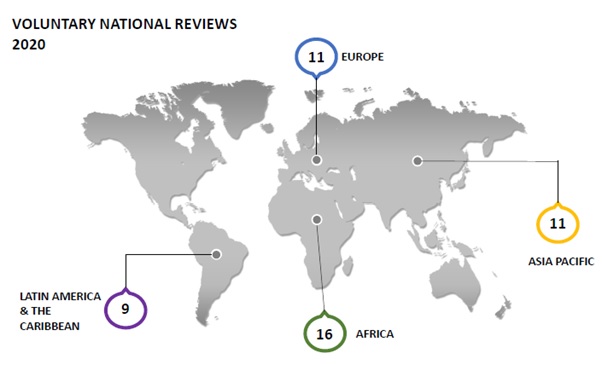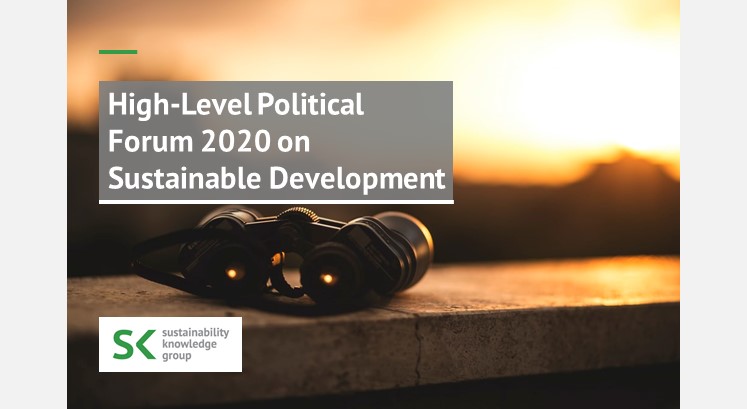Every year, the United Nations hold the High-level Political Forum (HLPF) on Sustainable Development to follow up and review the 2030 Agenda for Sustainable Development and the 17 Sustainable Development Goals (SDGs).
The forum is a multi-stakeholder platform where 197 countries exchange experiences and promote international cooperation in implementing the SDGs, define gaps and propose solutions.
The 2020 meeting was held on 7-16 July, under the theme “Accelerated action and transformative pathways: realizing the decade of action and delivery for Sustainable Development.” In light of the ongoing pandemic of COVID-19 and restrictions on personal meetings and international travel, technology solutions for virtual sessions and interactions were utilized to hold the forum.
The effect of COVID-19 on progressing towards the SDGs
During the forum sessions, the impact of COVID-19 on the progress of the SDGs was discussed, and speakers indicated that COVID-19 is likely to impact the SDGs profoundly.
COVID-19 is a major, multidimensional crisis that could affect the livelihoods of millions of people, amplifying poverty, hunger, and unemployment. The forum stressed the importance of promoting human well-being and placing it at the heart of the SDG agenda, of eradicating poverty, hunger and deprivation, supporting human rights, providing quality education and health, and ensuring equality.
Achieving human well-being cannot be achieved without protecting the environment and investing in it. One of the sessions held during the forum highlighted opportunities and solutions to protect the planet, build resilience and manage risks. The loss of biodiversity, land and forest degradation, climate change and natural hazards threaten the planet, human life, and well-being. During this session, speakers called on multiple stakeholders to address these threats through measures that promote economic and social development. Critical questions on the human-nature relationship, systemic risk creation and nature-based solutions were explored to create better outcomes for people, prosperity and planet.
The COVID-19 pandemic led to an economic recession and the least developed countries, landlocked developing countries, and African countries are the most affected, as they are vulnerable in terms of health systems, financial resources, and social protection systems. It is expected that the Fifth UN Conference on the Least Developed Countries, which will be convening in Qatar (21-25 March 2021), will provide an opportunity to formulate a new plan of action for the Least Developed Countries.
The forum reviewed the impact of the recession and discussed strategies that can be used to rebuild better and smarter, leaving no one behind. Recovering better and rebuilding requires multi-stakeholder cooperation. Accordingly, a session was dedicated to examining implications of the crisis to policies and strategies, international solidarity, responding to the crisis, and addressing the impacts of COVID-19 in accelerating progress towards achieving the SDGs. Speakers called on everyone to put long-term development plans to rebuild better, achieve human well-being, and ensure that no one is left behind.
The importance of the role of the UN and its institutions in charting the way forward towards more reliable and influential international cooperation was raised in a high-level conversation between the leaders. In this particular session, participants reflected on global solidarity, the role of the UN and the kind of multilateralism required during times of crisis. They discussed ways to provide an effective collective response in times of global crises and long-term challenges such as climate change in order to achieve long-term Sustainable Development.

Voluntary National Reviews (VNRs)
Where are we heading
A “Where are we heading” session was held to focus on visions, scenarios and expectations for the future of the SDGs after the COVID-19 crisis. During the session, Secretary-General António Guterres presented a report on “long term future trends and scenarios -impacts in the economic, social, and environmental areas on the realization of the SDGs.” The report contains best-case, business-as-usual and worst-case scenario outcomes for 2030 and 2050. A second report, “ECOSOC 2020”, focused on the accelerated actions needed during and beyond the COVID-19 response to reduce inequality and eradicate poverty.
No one is left behind
The COVID-19 crisis showcased that we were not on the right path to achieve SDGs by 2030. The HLPF called for promoting the integration of economic, social, and environmental dimensions and making concerted efforts to build a comprehensive plan for a sustainable and resilient future for people and the planet. The transformations necessary to achieve SDGs by 2030 are possible. Still, they require strong institutions, integrated policies, international cooperation, and dialogue with multiple stakeholders to ensure that no one is left behind.
Photo by Ran Berkovich on Unsplash

